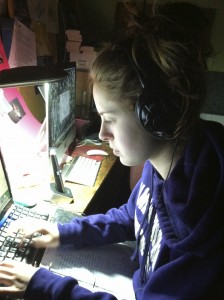Learning How to Write…From My Daughters
My girls are both writers. I’m not sure how I feel about it, given how difficult life can be as a writer. But even though they’ve gotten involved with things like theater, music, and dance, what they do at home when they have downtime is write. For fun.
These days they are both working on entries into a national competition. They both have such different working styles, but it’s been fascinating for me to watch and even learn from them.
Yep. I’ve been writing my whole life, now as a mystery novelist, cranking out a series and, believe me, I still learn things every day. It’s really not so surprising that I’ve picked up some writing tips from my daughters when parenting has been the most learning-intensive experience in my life.
Now, to be fair, these things that I’ve learned are not necessarily new, but they are excellent reminders. That’s one of the best things about parenting, isn’t it? The way your kids remind you, take you back to certain youthful moments—opening Christmas gifts, the magic of birthdays, learning to read, and to write.
Here’s my daughter-inspired writing reminder list:
- Figure out your working environment. Now this may seem simple enough. But working at a desk in front of a computer is not for everybody. Watching my oldest daughter Emma writing brought back a flood of memories to me. She takes a notebook and sits in front of the TV (while it’s on) and writes. Which is exactly what I used to do at her age. She then transposes it on to the computer. My younger daughter, Tess, loves to sit at the computer and write—but she does have notebooks filled with her thoughts as well. There is something about putting pen to page, about the way the pen glides across the page that is meditative for me. I must not forget that, even as I pluck away at the keyboard. But at the same time, writing by hand was a major obstacle for me to overcome in college—learning to write on the typewriter (now computer) and not in the notebook. Tess already has made that leap—but Emma’s process is important, too. In her transposing of text, she is also editing and reworking, and that is a huge step forward for any writer. That first draft is never worth much, so get over it and get on with the work.
- Write what you DON’T know. Writing is the best way for some of us to learn and live out our fantasies and dreams. If you follow “writer’s rules,” one of them is “write what you know.” It always makes me cringe. Part of my process has always been writing to discover, to learn, to communicate, and entertain. One of my daughter’s stories is about a gang. (My first novel was about a gang, too.) There’s something to be said for working that stuff out on the page—instead of real life. Feelings of not fitting in, finding others like you, and yes, even exploring darker, deeper sides of yourself. Writing about it gives you the emotional texture of having experienced it without the real dangers. My other daughter is writing a paranormal story about a young woman with special powers who is facing great changes in her life. Wow. Without the paranormal element of “special powers,” that could be any teenage girl’s story as she faces so many changes every day, right?
- Write what you love. Once again it sounds simple enough, doesn’t it? But I think especially as we mature and other things enter into our process—like keeping the market in mind—this might be one of the hardest lessons of all. Our time is finite, and we feel like we need to write what will sell to a publisher. If we are lucky, we hit a sweet spot where we enjoy what we’re writing and can sell it. Some days, I can hardly pull Tess off my computer to eat or watch TV because she says, “I’m writing, Mom.” And I have to tell you the only kind of writing worth doing is precisely that kind of writing. Because if it doesn’t hold your interest, it’s not going to hold your reader’s interest either.
I love what I do. It’s my sanity, my escape, and my work all rolled into one. If I didn’t love it, if I could think of something else I’d be good at, something else that could hold my interest and earn me a living, I’d do it—because writing is also a heartbreaking, lonely, gut wrenching experience. The business is one of the toughest and cruelest. One of the edges I walk is trying to don a vigilant thick skin, while allowing myself to open up enough to write honest words on the page. Sometimes when I read a negative review or I get a rejection, I hibernate awhile and lick my wounds. But the words and the page pull me back every time.
“What if I don’t win this contest?” Tess asked me one morning. “What if I work so hard on it and I don’t win, then what happens?”
“Are you writing the story just to win the contest?” I asked.
She thought for a moment or two. “I’m writing it faster because of the deadline, but I’d probably write it anyway. I like the story, and I’m having fun.”
And that, my friends, is exactly what I wanted to hear.

“Write what you don’t know”.
A lot of the stuff I’ve written came about *because* I didn’t know about it. A whole bunch of questions would lead to a book, story, or poem–even when it was just a phrase that I was curious about. (For example a couple of days ago I ran across the scientific term “Twisted Light”, said “What’s that?”, found out, and ended up writing a poem around it.)
So good for them! (On all counts.)